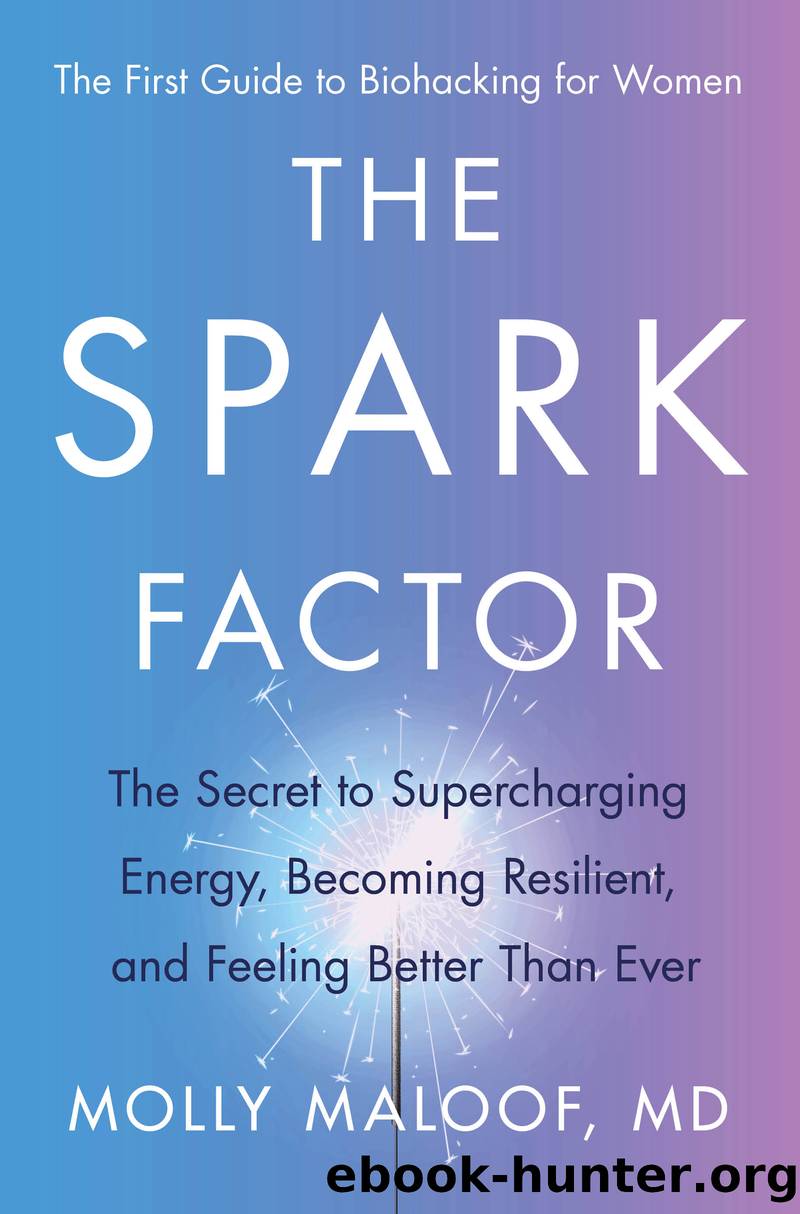The Spark Factor by Dr. Molly Maloof

Author:Dr. Molly Maloof
Language: eng
Format: epub
Publisher: HarperCollins
Published: 2022-11-29T00:00:00+00:00
Who Shouldnât Fast
Before I get into the details of how to fast, a disclaimer: if you are young (in your twenties) and healthy, you probably donât need to do a lot of fasting, if any. Being young doesnât bar you from fasting, and Iâve found that plenty of young men love it, but young women who are fertile and healthy (without problems like PCOS) may not need to fast more than twelve hours. They can achieve ketosis through exercise and carb cycling. Fasting can be too stressful because theyâre already metabolically flexible. Itâs important to develop healthy eating habits when you are young rather than emphasize fasting.
Athletes also have to be careful. Female athletes are more likely to experience hormone dysfunction if they fast (or just undereat) while engaging in strenuous activity. For most athletes, especially those who are young women, the priority should be to make sure you are eating the right foods and not limiting your calories. I dig into Relative Energy Deficiency of Sport in chapter 12, which is a health condition not to take lightly.
The cool thing about exercise is that it offers a lot of the same cellular housecleaning benefits as fasting, which is why sedentary people may be better candidates for fasting than athletes. Fasting becomes more important as we age and lose that metabolic flexibility. Remember, thereâs a difference in the biological imperatives of men and women, and there is also a difference in the biological imperatives of young and old. Young people are in a growth state. Data suggests that calorie restriction and intermittent fasting can compromise certain immune responses in juveniles but can enhance immune function in adults. As individuals get older, into their thirties, forties, fifties, and beyond, fasting becomes much more useful. Even then, remember to pay attention to how your body responds. It will tell you if what youâre doing is working or if you should stop.
Other situations where people should not fast: if they have excessively low body fat, are pregnant or breastfeeding, are new to health and wellness, or have a sleep disorder. Itâs also so important to understand that fasting can exacerbate a current or past eating disorder. If you have a history of eating disorders, I recommend skipping this section altogether. The benefits are not worth the risks, in my opinion.
If youâre diabetic, I recommend consulting with your doctor before you begin a fasting regimen because it can impact your need for insulin and other medications and you may end up needing to lower your doses.
Finally, if you are dealing with a lot of stress and have signs of hormonal dysfunction like thyroid problems or low cortisol, your focus should not be on fasting. It should be on recovery from stress, which can take six to nine months. I canât emphasize this enough. After a period of extreme stress during the COVID-19 pandemic, I struggled with fasting and found I just couldnât do it anymore. My body was telling me it wasnât the right time to pile stressors on top of stressors.
Download
This site does not store any files on its server. We only index and link to content provided by other sites. Please contact the content providers to delete copyright contents if any and email us, we'll remove relevant links or contents immediately.
| Breast Cancer | Candida |
| Chronic Fatigue Syndrome & Fibromyalgia | Endometriosis |
| General | Lupus |
| Menopause | Menstruation |
| Postpartum Depression | Pregnancy & Childbirth |
| Sexual Health |
Name Book, The: Over 10,000 Names--Their Meanings, Origins, and Spiritual Significance by Astoria Dorothy(2496)
Tone Your Tummy Type by Denise Austin(2372)
The Women's Health Fitness Fix by Jen Ator(1927)
The Expectant Father by Armin A. Brott & Jennifer Ash(1898)
The Coregasm Workout by Debby Herbenick(1824)
The Ultimate Guide to Anal Sex for Women by Tristan Taormino(1758)
Expecting Better by Emily Oster(1711)
She-ology by Sherry A. Ross MD(1701)
The Hite Report on Shere Hite by Shere Hite(1666)
8 Steps to Reverse Your PCOS by Fiona McCulloch(1598)
Woman: An Intimate Geography by Natalie Angier(1586)
Birth by Tina Cassidy(1573)
Women & the Weight Loss Tamasha by Diwekar Rujuta(1528)
The Female Brain by M.D. Louann Brizendine(1518)
101 Get-Lean Workouts and Strategies by Muscle & Fitness(1509)
50 Ways to Soothe Yourself Without Food by Susan Albers(1403)
The Big Booty Blueprint: Your Guide To A Bigger Butt In Less Than 12 Weeks by Bella Rahbek & Brandon Carter(1369)
Unleash the Power of the Female Brain: Supercharging Yours for Better Health, Energy, Mood, Focus, and Sex by Daniel G. Amen M.D(1289)
The overachievers by Robbins Alexandra(1287)
